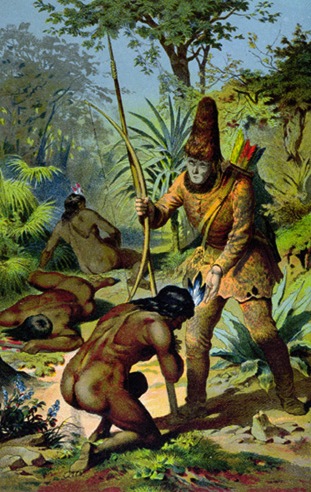
Robinson Crusoe and Man Friday, Carl Offterdinger (1829-89)
On May, 6, 1719 (julian calendar, April 25), Daniel Defoe‘s famous novel ‘Robinson Crusoe‘ was published under the title ‘The Life and Strange Surprizing Adventures of Robinson Crusoe, of York, Mariner: Who lived Eight and Twenty Years, all alone in an un-inhabited Island on the Coast of America, near the Mouth of the Great River of Oroonoque; Having been cast on Shore by Shipwreck, wherein all the Men perished but himself. With An Account how he was at last as strangely deliver’d by Pirates.‘ Robinson Crusoe was well received in the literary world and is often credited as marking the beginning of realistic fiction as a literary genre.
“I learned to look more upon the bright side of my condition, and less upon the dark side, and to consider what I enjoyed rather than what I wanted; and this gave me sometimes such secret comforts, that I cannot express them; and which I take notice of here, to put those discontented people in mind of it, who cannot enjoy comfortably what God has given them, because they see and covet something that He has not given them. All our discontents about what we want appeared to me to spring from the want of thankfulness for what we have.”
Daniel Defoe, Robinson Crusoe, Ch. 9, A Boat.
Daniel Defoe’s most famous Piece of Work
‘Robinson Crusoe’ was most likely Daniel Defoe’s most famous and popular piece of work, but not his first and only. The author, who once was occupied as a merchant and traveled through Europe was not quite successful in doing so and soon began dedicating his life to writing. Defoe wrote many autobiographical works related to contemporary political, economical, and social events. ‘An Essay Upon Projects‘ depicts one of these essays, published in 1697. Defoe also enjoyed poetry, often quite satirical like ‘The True-Born Englishman‘, published in 1701. The poem, in which he stood up for more tolerance towards religious and ethnic minorities made Daniel Defoe internationally famous. Due to the many opposers he had to face during his struggle for tolerance and freedom in England, Daniel Defoe has been arrested and was quite poor. He began his career as journalist in the early 1700’s and in 1719, his debute novel ‘The Life And Strange Surprizing Adventures Of Robinson Crusoe‘ was finally published and faced a great success, even though Defoe earned only very little from the profit of his work.
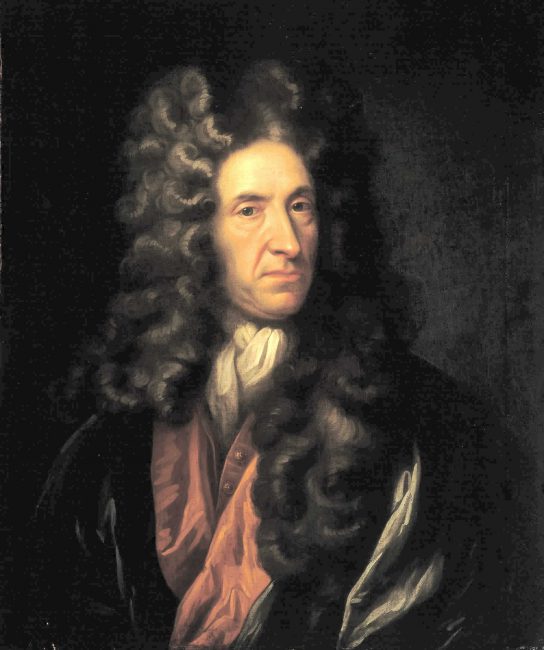
Portrait of Daniel Defoe, National Maritime Museum, London
Robinson Crusoe really existed
Robinson Crusoe really existed and was originally named Alexander Selkirk. The Scottish sailor was marooned on a lonely island in the South Pacific after a heavy discussion with the captain in 1704. Selkirk lived on the island for about four years and was then rescued by Woodes Rogers‘ expedition. Since the sensational ‘case’ of Selkirk became known widely, many writers were inspired in their later works by the adventures the marooned may have experienced. A few years after his rescue, Rogers himself wrote the book ‘A Cruising Voyage Round the World‘ and further works, such as ‘The Englishman‘ by Richard Steele appeared. When Daniel Defoe published the adventures of Robinson Crusoe, many readers were firstly disappointed due to Defoe’s many variations from the real adventures of Selkirk. Still, there were noticeable similarities and Defoe’s book on Crusoe was a great success, as Edgar Allan Poe once noted: “It has become a household thing in nearly every family in Christendom!“.[7]
You know the Plot
I guess there is hardly anybody in the Western world, who does not know the plot – well, more or less. In 1651, Robinson Crusoe left York, England, against the wishes of his parents who wanted him to become a lawyer, to sail. After several adventures, including a pirate assault, rescue by a Portuguese ship and becoming a plantation owner in Brazil, he joined an expedition in search of African slaves in 1659. But after a storm he was shipwrecked on an island at the mouth of the Orinoco River in South America. All his companions being dead, he managed to recover weapons and tools in the wreck. He discovered a cave, build a house and made a calendar by making notches in a piece of wood. He hunted and grew wheat. He learned how to make pottery and raised goats. He read the Bible and he lacked nothing but the company of men. One day, he realized that the island is periodically visited by cannibals, who come to kill and eat their prisoners. Crusoe, who considered their behavior abominable, thought of exterminating them, but he realized that he had no right, since the cannibals did not attack him and did not know that their act was criminal. He dreamed of obtaining one or two servants by releasing prisoners and, in fact, when one of them managed to escape, they became friends. Crusoe named his companion “Friday”, the day of the week when he appeared. He taught him English and converted him to Christianity. The rest of the story, including his salvation 28 years later, I’ll leave to the avid reader.
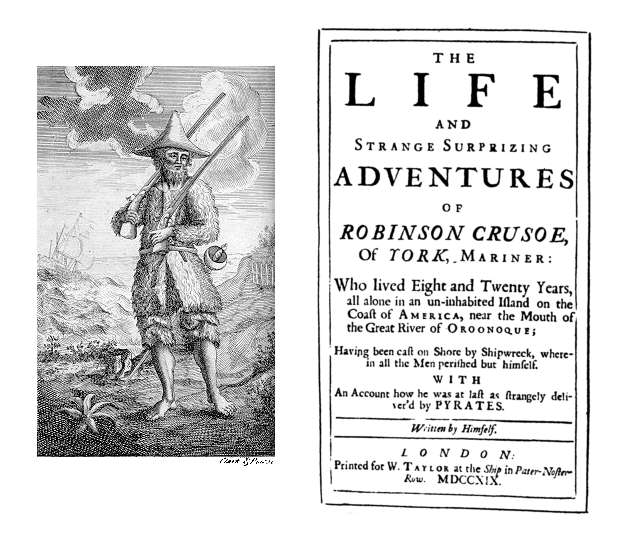
Daniel Defoe, Robinson Crusoe, Title page from the first edition (1719)
And the Interpretations
As many people read Defoe’s masterpiece as many interpretations on its content probably appeared. Some see Robinson Crusoe’s adventures as symbolic for British colonists, who have often been described as rather cruel, yet independent and intelligent. Also, Crusoe tries to assimilate his mate Friday to European cultures and hierarchies and often referred to himself as the king of the island. Also, the novel features many religious aspects, since he is spending lots of time by himself with only the bible to read, which brings him closer to God and to praying.
The Uselessness of Money
Despite the religious and moral interpretations of the novel’s plot, economists reflect several economical processes on the development of Robinson Crusoe through the years. At first, when he thinks of being alone on the island, Crusoe notices the uselessness of the money he had compared to his tools. Karl Marx later analyzed this fact in terms of the value of labor and capital in ‘Das Kapital‘.[8] Also it is emphasized, how without money, prices and trade, Robinson Crusoe has to allocate between production and free time to meet all of his needs. When Friday arrives, it was demonstrated how trade of goods advanced the man’s life.
Establishing Realistic Fiction as Literary Genre
Daniel Defoe’s novel was an important step in establishing realistic fiction as a whole literary genre. Adventurer and cast away stories became popular and later on many television series, stage performances and movies appeared starring Robinson Crusoe or a similar adventurous figure.
Susan Oliver, Robinson Crusoe by Daniel Defoe, [10]
References and Further Reading:
- [1] Edgar Allan Poe’s critical article
- [2] Robinson Crusoe gab es tatsächlich at Welt online
- [3] “Trapped on a Pacific Island: Scientists Research the Real Robinson Crusoe” at Spiegel online
- [4] Robinson Crusoe as Economic Man
- [5] Religion in Robinson Crusoe
- [6] Daniel Defoe Blog
- [7] The Mysterious Death of Edgar Allan Poe, SciHi Blog
- [8] Karl Marx and Das Kapital, SciHi Blog
- [9] Daniel Defoe at Wikidata
- [10] Susan Oliver, Robinson Crusoe by Daniel Defoe, Enlightenment module (CS101), University of Essex @ youtube
- [11] Backscheider, Paula R. (January 2008) [2004]. “Daniel Defoe (1660?–1731)”. Oxford Dictionary of National Biography (online ed.). Oxford University Press.
- [12] Torselli, Stefano. “Daniel Defoe”. www.baroque.it.
- [13] Novak, Maximillian (2001). Daniel Defoe : master of fictions : his life and ideas. Oxford; New York: Oxford University Press
- [14] “Defoe, Daniel”. The Encyclopedia of Science Fiction. Online edition (3rd ed., 2011). Biographical entry by editors John Clute and Peter Nicholls.
- [15] Minto, William (1879). Daniel Defoe. New York: Harper & Bros.
- [16] Hymer, Stephen (September 1971). “Robinson Crusoe and the secret of primitive accumulation”. Monthly Review. 23 (4): 11.
- [17] Little, Becky (2016-09-28). “Debunking the myth of the ‘real’ Robinson Crusoe”. National Geographic.
- [18] Timeline for Daniel Defoe, via Wikidata

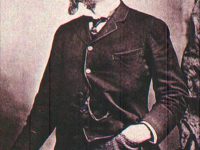


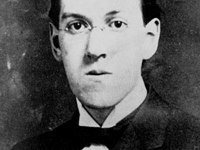

Pingback: Aptis General Reading part 2